Well, the U.S. Thanksgiving break is here, and you know what that means for many of the members of Culture on the Edge…
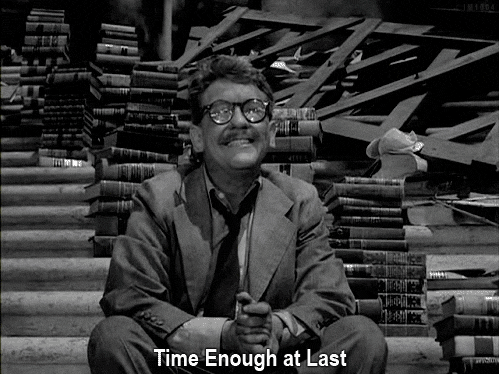

A Peer Reviewed Blog
Well, the U.S. Thanksgiving break is here, and you know what that means for many of the members of Culture on the Edge…


For a new Culture on the Edge series “You Are What You Read” we’re asking each member to answer a series of questions about books — either academic or non-academic — that have been important or influential on us.
4. Name a book that could serve as the perfect foil for your current research project (e.g., an example of a scholarly trend you’re working against).
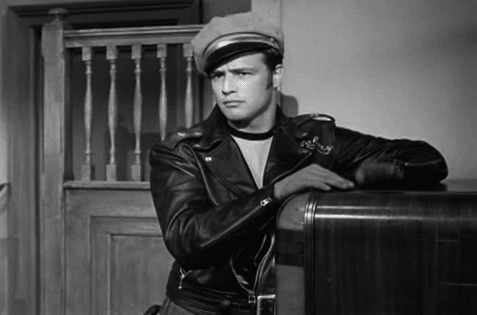 Mildred: Hey Johnny, what are you rebelling against?
Mildred: Hey Johnny, what are you rebelling against?
Johnny: Whadda ya got?
(“The Wild One” [1953])

For a new Culture on the Edge series “You Are What You Read” we’re asking each member to answer a series of questions about books — either academic or non-academic — that have been important or influential on us.
4. Name a book that could serve as the perfect foil for your current research project (e.g., an example of a scholarly trend you’re working against).
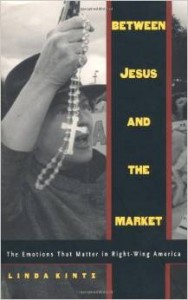
When I think about a trend in scholarship that I’m working against, I (ironically) consider one of the first volumes that shifted my academic path towards the study of rhetoric, and which remains one of the most influential volumes to my present focus today. Previously in this series I mentioned the pivotal role that Roland Barthes’ Mythologies played early on in my thinking, but in terms of influence, I could just as easily have mentioned Between Jesus and the Market: The Emotions That Matter in Right-Wing America, by Linda Kintz.
Kintz’s work earns a paradoxical place in my mind for the same reason that I feel so conflicted about much of the scholarship on evangelicalism and fundamentalism out today: although often historically incisive and analytically helpful, Kintz writes with a clear agenda to politically defeat her subjects. What strikes me as odd about this position is that almost all scholars who do this contextualize their own political positions as somehow fundamentally different from those that they critique. This, to me, is worth mention because believing that one is fundamentally different from those that they study often proves to be an analytically questionable position. Continue reading “You Are What You Read, with Leslie Dorrough Smith (Part 4)”
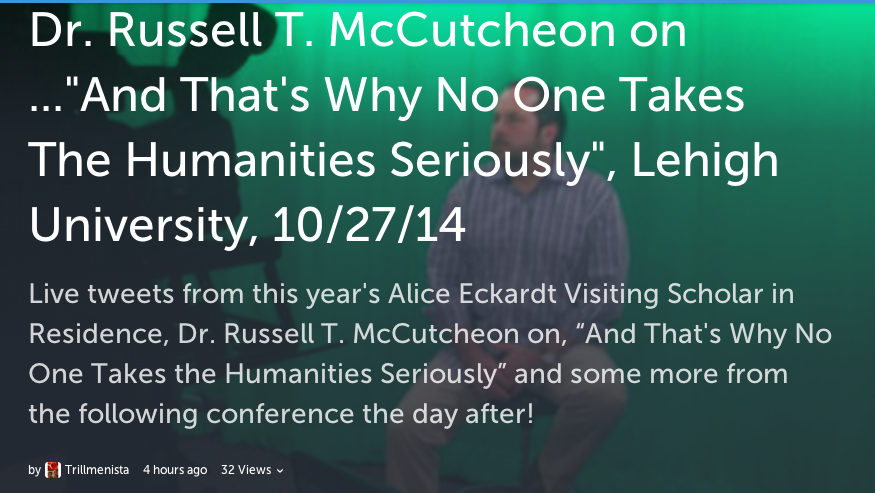
During the last week of October, Culture on the Edge‘s Russell McCutcheon, Monica Miller, and Vaia Touna presented at Lehigh University’s Collaborations: Directions in the Study of Religion. The Edge’s Russell McCutcheon delivered the Plenary address “And That’s Why No One Takes the Humanities Seriously.” The conference included panels on “Tradition,” with a presentation from the Edge’s Vaia Touna, “The Past,” “Identity,” and “Experience,” with a presentation from Monica Miller.
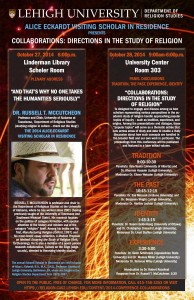
Lehigh University published a few articles on the conference, which can be found here and here. Lehigh’s own De’Anna Monique Daniels (@DeAnnaMonique) made a Storify of the Plenary which can be found here.
While McCutcheon was there, Lehigh also interviewed him regarding his thoughts on the Humanities and the study of religion in the university. Take a look at what he had to say…
Dr. Russell McCutcheon from Lehigh IMRC.
Special thanks to Lehigh University for hosting this conference and passing this along!
 Well, how to post in the wake of Monica Miller’s post yesterday on Kim K’s derriere? That’s the question. Continue reading ““I’m Bringing Booty Back…””
Well, how to post in the wake of Monica Miller’s post yesterday on Kim K’s derriere? That’s the question. Continue reading ““I’m Bringing Booty Back…””
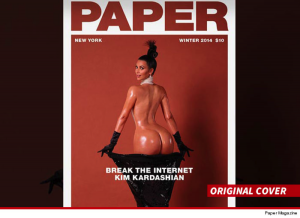 As I’m sure we’ve all heard by now, Kim Kardashian’s backside, displayed for the world’s consumption and viewing pleasure (or not) on the front cover of Paper Magazine, “broke the Internet” just a short while ago and has since caused a flurry of debate, shock, praise, and disbelief. Add to that a big-booty praise of “#allday” from her beloved husband, Kanye West which received thousands of Retweets. I’ll leave it for those entering into the debate with interests and intentions of conflict management and moral maintenance to weigh in on what Kim’s big ‘ole butt plastered on the Internet for the world to view and deconstruct means for progress, freedom, justice, feminism, America, motherhood, identity politics, women, sexuality, Kanye, blackness, and much, much more. Amazing how a bare ass on a magazine can speak to and says something about such a *****wide***** variety of topics!
As I’m sure we’ve all heard by now, Kim Kardashian’s backside, displayed for the world’s consumption and viewing pleasure (or not) on the front cover of Paper Magazine, “broke the Internet” just a short while ago and has since caused a flurry of debate, shock, praise, and disbelief. Add to that a big-booty praise of “#allday” from her beloved husband, Kanye West which received thousands of Retweets. I’ll leave it for those entering into the debate with interests and intentions of conflict management and moral maintenance to weigh in on what Kim’s big ‘ole butt plastered on the Internet for the world to view and deconstruct means for progress, freedom, justice, feminism, America, motherhood, identity politics, women, sexuality, Kanye, blackness, and much, much more. Amazing how a bare ass on a magazine can speak to and says something about such a *****wide***** variety of topics!
Something more interesting — and fascinating (in my opinion) has caught my attention about the unfolding conversation and ensuing public debate and discourse — that has seemingly little to do with the perceived “object” of study here. I’m more curious about how all of these emerging grand claims to truth (seen in what follows below) sparked by Kim K’s naked badonkadonk are helping it to break the Internet and make possible the Sui Generis booty she (and the world) thinks is so NOT-unique, or, not unique enough to warrant all of the hype. One is not born a big booty, rather, one becomes a big booty, so it seems. We have manufactured the Kardashian booty that we so love to hate and hate to love. Continue reading “Manufacturing Booty: On How We Stake Our Claims”

For a new Culture on the Edge series “You Are What You Read” we’re asking each member to answer a series of questions about books — either academic or non-academic — that have been important or influential on us.
3. Name one of your favorite books that’s not a theory book.
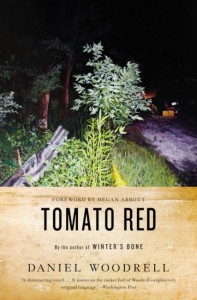 Asking about my favorite non-theory book is kind of like asking about my favorite child. As such, I’ll dodge that question and say that it’s a tie between all of the Harry Potter books and all of the Daniel Woodrell books. The first Woodrell book I read was Tomato Red. Next was The Death of Sweet Mister, followed by Winter’s Bone (remember that Jennifer Lawrence movie? Woodrell wrote the book), and all of the others shortly followed (most recently for me, The Maid’s Version). The Harry Potter books don’t need any sort of explanation, I suspect. But Daniel Woodrell might, and he’s well worth the introduction.
Asking about my favorite non-theory book is kind of like asking about my favorite child. As such, I’ll dodge that question and say that it’s a tie between all of the Harry Potter books and all of the Daniel Woodrell books. The first Woodrell book I read was Tomato Red. Next was The Death of Sweet Mister, followed by Winter’s Bone (remember that Jennifer Lawrence movie? Woodrell wrote the book), and all of the others shortly followed (most recently for me, The Maid’s Version). The Harry Potter books don’t need any sort of explanation, I suspect. But Daniel Woodrell might, and he’s well worth the introduction.
I suppose one of the reasons why I’ve got such strong feelings for Woodrell is not only because he’s an absolutely amazing writer, but because he writes largely about the region where I’m from. I grew up in the Ozarks, and although I was not a child on the verge of starvation living at the whim of my mostly-absent meth-dealing parents, when you live in the places about which Woodrell writes, these realities are never far away if you know where to look. Continue reading “You Are What You Read, with Leslie Dorrough Smith (Part 3)”
 Have you heard about the court case over whether a product without eggs can be defined as mayonnaise? Continue reading “Mayonnaise: What is It?”
Have you heard about the court case over whether a product without eggs can be defined as mayonnaise? Continue reading “Mayonnaise: What is It?”

For a new Culture on the Edge series “You Are What You Read” we’re asking each member to answer a series of questions about books—either academic or non-academic—that have been important or influential on us.
1. Name a book you read early on that shaped the trajectory of your career.
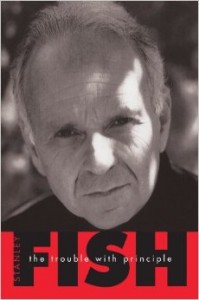 During my senior year of college I picked up a copy of Stanley Fish’s The Trouble with Principle, and it has made an indelible impact on me. In the book, Fish suggests that abstract principles — specifically abstract liberal principles such as “freedom,” “equality,” “inclusion,” “tolerance,” or “neutrality” — are, in and of themselves, vacuous of any particular content and can, in practice, be turned to support just about any social agenda. To use another analytical vocabulary: abstract liberal principles are floating signifiers that, in context, can be fixed to any particular referent, depending on the skill of the rhetorician at work. Fish suggests that liberal proceduralism — the attempt to find and apply non-partisan political principles — is, ultimately, a theoretically bankrupt affair, as abstract principles only begin to take shape when fixed to partisan projects. If it’s politics all the way down, the presentation of one’s own view as above the fray can be reduced to a form of legitimation. That is not to say that what is theoretically bankrupt is not politically useful: in good Nietzschean fashion Fish assumes that partisan contestation is the nature of the game, and that presenting one’s partisan agenda as neutral is a powerful way of winning social and political contests.
During my senior year of college I picked up a copy of Stanley Fish’s The Trouble with Principle, and it has made an indelible impact on me. In the book, Fish suggests that abstract principles — specifically abstract liberal principles such as “freedom,” “equality,” “inclusion,” “tolerance,” or “neutrality” — are, in and of themselves, vacuous of any particular content and can, in practice, be turned to support just about any social agenda. To use another analytical vocabulary: abstract liberal principles are floating signifiers that, in context, can be fixed to any particular referent, depending on the skill of the rhetorician at work. Fish suggests that liberal proceduralism — the attempt to find and apply non-partisan political principles — is, ultimately, a theoretically bankrupt affair, as abstract principles only begin to take shape when fixed to partisan projects. If it’s politics all the way down, the presentation of one’s own view as above the fray can be reduced to a form of legitimation. That is not to say that what is theoretically bankrupt is not politically useful: in good Nietzschean fashion Fish assumes that partisan contestation is the nature of the game, and that presenting one’s partisan agenda as neutral is a powerful way of winning social and political contests.
While today I find the details of Fish’s analysis weak at a number of points, I nevertheless remain convinced of his argument on the whole. In a field like the study of religion — many corners of which are saturated with liberal rhetoric — I find Fish’s suspicion of liberal discourse continually useful.

For a new Culture on the Edge series “You Are What You Read” we’re asking each member to answer a series of questions about books—either academic or non-academic—that have been important or influential on us.
2. Name one of your favorite theory books.
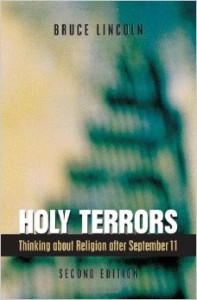 Bruce Lincoln, Holy Terrors: Thinking About Religion After 9/11 (Chicago: University of Chicago Press, 2003)
Bruce Lincoln, Holy Terrors: Thinking About Religion After 9/11 (Chicago: University of Chicago Press, 2003)
This is one of my favorite theory books because of its approach toward and definition of religion. The definition, which has four parts, revolves around the first component: the foundation of religion, Lincoln asserts, is discourse. What makes religious discourse different from other types of discourse is that it appeals to a transcendent source (the most familiar version of which is “God”), which subsequently sets that claim beyond effective human critique significantly increasing the political weight of such claims. The other three components (practices, communities, and institutions) come to life only insomuch as they are socio-structural manifestations of that discourse. Continue reading “You Are What You Read, with Leslie Dorrough Smith (Part 2)”